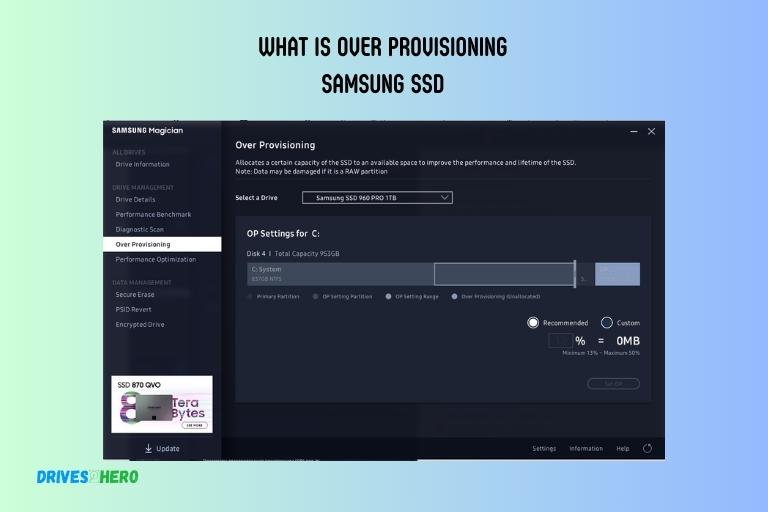What Is Over Provisioning Samsung Ssd? A Simple Guide!
Over-provisioning in Samsung SSDs refers to the practice of allocating a portion of the drive’s capacity beyond what is advertised for user storage.
This additional space is reserved for the drive’s internal use, primarily for wear leveling, bad block management, and other maintenance tasks.
Wear leveling is particularly crucial in NAND flash-based storage devices, like SSDs, as it ensures even distribution of write and erase cycles across the memory cells, thereby extending the lifespan of the drive.
By setting aside a specific percentage of the SSD’s total capacity for over-provisioning, Samsung can enhance the drive’s durability, performance, and overall reliability.
This strategy helps to mitigate issues associated with long-term use, such as performance degradation and potential data loss, providing users with a more robust and enduring storage solution.

Key Takeaway
How Over Provisioning Works In Samsung Ssd?
Over-provisioning (OP) is a technique used in Samsung SSDs to optimize performance and enhance reliability. By allocating a portion of the drive’s capacity as free space, Samsung SSDs can perform more efficiently and deliver consistent speed.
- Reserved Space: Samsung SSDs set aside a certain percentage of the drive’s total capacity as over-provisioned space, which is not accessible for data storage. This space is utilized by the SSD’s firmware to optimize performance and ensure long-term reliability.
- Wear-Leveling: Over provisioning enables wear-leveling algorithms to operate effectively. These algorithms evenly distribute write operations across different NAND memory cells, preventing any particular cell from wearing out prematurely.
- Garbage Collection: The over-provisioned space allows for efficient collection, where the SSD’s firmware identifies and clears out data blocks that are no longer in use. This helps to maintain the SSD’s performance by ensuring that only relevant and necessary data is stored on the drive.
- Background Activities: Over provisioning gives the SSD dedicated space for performing background activities like error correction and data refreshing. These activities help to maintain the integrity of stored data and ensure the SSD’s resilience over time.
Over provisioning in Samsung SSDs plays a crucial role in enhancing endurance, improving performance, and ensuring the reliable operation of the drive.
By setting aside a specific portion of the SSD’s capacity as free space, over provisioning enables the drive to function optimally and deliver consistent speed, even under demanding conditions.
Importance Of Over Provisioning In Samsung Ssd
Over-provisioning plays a crucial role in Samsung SSDs by allowing the drive to maintain peak performance and extend its lifespan.
By reserving a certain amount of space for background task management, it improves overall efficiency and reliability.
Enhancing Performance And Endurance
- Improved lifespan: Allocating reserved space through over-provisioning helps reduce wear and tear on NAND flash memory cells, significantly extending the lifespan of the SSD.
- Enhanced performance: By leaving extra space for the drive to operate efficiently, Over Provisioning allows for better garbage collection, wear leveling, and error correction, leading to improved overall performance.
- Faster read and write speeds: With Over Provisioning, Samsung SSDs can achieve faster read and write speeds, as the excess space allows for optimized data distribution and management.
Increasing Write Amplification Reduction
Write amplification reduction:
- Over-provisioning reduces write amplification, a phenomenon where more data is written to the drive than what the host system intended.
- This is achieved by providing additional free space for the SSD to perform wear leveling and garbage collection, resulting in decreased write amplification.
Improved random write performance:
- By minimizing write amplification, Provisioning improves random write performance, allowing for faster and more efficient data storage and retrieval.
Over-provisioning plays a crucial role in optimizing the performance and endurance of Samsung SSDs.
By allocating reserved space, it enhances the lifespan of the drive and boosts overall performance. It reduces write amplification, leading to improved random write performance.
Over Provisioning Techniques For Samsung SSD
Provisioning Techniques for Samsung SSD is a crucial aspect of optimizing the performance and lifespan of the SSD. It involves allocating a portion of the drive’s capacity for background processes and wear leveling, enhancing overall efficiency and reliability.
Static Over Provisioning:
- Allocating fixed space for OP: In static over-provisioning, a fixed amount of storage space is set aside on the Samsung SSD for over-provisioning. This space is not accessible to the user and is used by the drive for various maintenance tasks.
Pros and cons of static OP:
- Improves drive performance: Static over-provisioning helps improve the overall performance of the Samsung SSD. By having dedicated space for background operations, the drive can maintain a high level of performance even under heavy workloads.
- Enhances drive endurance: The fixed space allocated for over-provisioning extends the lifespan of the SSD by evenly distributing write operations across the available cells. This reduces wear and tear on individual cells and increases the drive’s durability.
- Limited flexibility: One drawback of static over-provisioning is that the space allocated for over-provisioning cannot be easily adjusted. Once set, it remains constant, regardless of the workload. This means that the SSD may not be fully utilizing its potential during periods of light usage.
Dynamic Over Provisioning:
Allocating variable space for OP based on workload:
- Dynamic over-provisioning, on the other hand, dynamically adjusts the amount of space dedicated to over-provisioning based on the workload.
- This allows the Samsung SSD to adapt and optimize its performance according to the specific demands placed on it.
Benefits of dynamic OP:
- Maximizes storage capacity: Dynamic over-provisioning ensures that the Samsung SSD utilizes its entire storage capacity, reserving only the necessary space for over-provisioning. This enables users to make the most of the available storage without compromising performance or endurance.
- Optimizes performance: Samsung SSDs employ dynamic space allocation for overprovisioning, prioritizing active workloads, and allocating additional space for background processes as required. This optimization technique ensures consistent performance under varying workloads.
- Improves endurance management: Dynamic overprovisioning allows the SSD to adapt its overprovisioning space based on usage patterns. This improves endurance management by allocating more space for overprovisioning during heavy write activity, ultimately extending the SSD’s lifespan.
By employing either static or dynamic over-provisioning techniques, Samsung SSDs can offer improved performance, endurance, and storage capacity.
These techniques ensure that the SSDs are efficient, adaptable, and capable of delivering optimal performance for a wide range of applications.
The Impact of Provisioning On Samsung SSD Lifespan
Over-provisioning is an essential feature in Samsung SSDs that helps boost performance and extend lifespan.
By allocating additional storage space for maintenance tasks, it prevents excessive wear on the drive and enhances overall durability, ensuring optimal performance for longer periods.
Reducing Wear Leveling
- By allocating additional space beyond the usable storage capacity, over-provisioning helps distribute write operations more evenly across the entire SSD. This minimizes the wear and tear on individual memory cells, prolonging the lifespan of the drive.
- Wear leveling algorithms are responsible for evenly spreading write operations across memory cells, but with over-provisioning, the SSD has more available sectors to work with.
- This reduces the strain on specific areas of the drive, preventing premature wear and increasing overall durability.
Power Consumption
- Over-provisioning not only benefits the lifespan of the SSD but also contributes to reducing power consumption. With additional space available, the SSD can perform internal maintenance operations more efficiently, consuming less power during these processes.
- By optimizing power usage, over-provisioning helps extend the battery life of devices that use Samsung SSDs, such as laptops and mobile devices.
- It ensures that the SSD operates more efficiently, minimizing the energy required for internal operations and enhancing overall performance.
Over-provisioning plays a critical role in improving the lifespan of Samsung SSDs. By reducing wear leveling and power consumption, it optimizes the drive’s performance and durability.
The additional space provided by over-provisioning ensures more consistent write distribution and helps minimize strain on specific memory cells.
Best Practices For Over Provisioning Samsung Ssd
Over-provisioning Samsung SSD involves allocating a portion of the drive for maintenance purposes, resulting in improved performance and longevity. This practice enhances the drive’s efficiency by reducing write amplification and extending its lifespan.
Here are some best practices to follow when it comes to over-provisioning Samsung SSD:
Determining The Optimal Amount Of Provisioning
To determine the ideal amount of over-provisioning for your Samsung SSD, consider the following factors:
- Drive size: Larger drives (1TB or more) typically require a smaller percentage of over-provisioning compared to smaller drives (250GB or less).
- Usage: Higher utilization rates and heavy workloads may benefit from a higher percentage of over-provisioning.
- Expected lifespan: For extended SSD lifespan, consider allocating a higher percentage of over-provisioning.
Monitoring And Maintaining Over Provisioning Levels
Once you have determined the optimal amount of over-provisioning for your Samsung SSD, it is essential to monitor and maintain the levels over time.
Here are some key practices to ensure effective management:
- Regular monitoring: Keep track of the over-provisioning levels to detect any deviations or changes that may affect performance.
- Firmware updates: Stay up to date with the latest firmware releases from Samsung to maximize the efficiency of your SSD and ensure proper over-provisioning functionality.
- Backup and data migration: Before making any changes to the over provisioning settings, it is crucial to backup your data to prevent any potential loss.
- Trim and garbage collection: Enable the Trim command and periodic garbage collection to prevent data fragmentation and maintain optimal performance.
- Avoid excessive over provisioning: While over provisioning is beneficial, too much of it may lead to reduced usable capacity. Find the right balance to optimize performance without sacrificing storage space.
By following these best practices for over provisioning your Samsung SSD, you can enhance its performance, durability, and ensure a long lifespan. Regularly monitor and maintain your over provisioning levels to achieve the best possible results.
Remember, each SSD may require different settings, so it’s essential to consider your specific requirements and adjust accordingly.
Conclusion
Understanding what over-provisioning means for your Samsung SSD is crucial for optimizing its performance and extending its lifespan.
By allocating a portion of your SSD’s storage space for maintenance, wear leveling, and garbage collection, you can ensure that your drive operates at its best.
Over-provisioning can enhance the SSD’s endurance by preventing excessive writes to a small set of cells, which can cause premature failure.
It prevents performance degradation over time by reducing fragmentation and improving the efficiency of data storage and retrieval.






